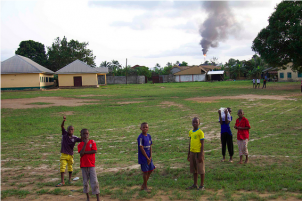
By Leah Temper.
The recent Kiobel verdict in the Supreme Court in favour of Shell that will limit the ability to try corporations for human and environmental rights abuses under the Alien Tort Statute in the US makes the establishment of an international court to deal with environmental crimes that much more imperative. Corporations currently represent 51 out of 100 of the biggest economic entities in the world; the remaining 49 are countries. The ATS was originally seen as a means not to grant “safe harbour” to pirates. Corporations are in a way the modern day pirates. They have “personhood” rights, yet no accountability and often no clear or fixed abode. The US was the ideal court of last resort because almost all of the 500 biggest multinationals have some kind of presence there. In the case of Shell, another reason was that the U.S. remains the largest importer of Nigerian crude.
On a recent trip to the Niger delta, we saw how two decades after the peaceful uprising spearheaded by Ken Saro Wiwa, Kiobel and the Movement for the Liberation of the Ogoni People, popular demands for justice remain unmet and social and environmental abuses continue to abound. Despite the fact that oil no longer flows from Ogoniland, oils spills continue to devastate communities and their traditional livelihoods as fishers and farmers. Every year, as many barrels spill into the Delta’s unique riverine ecosystem from Shell’s vast network of corroding pipelines and old wellheads as was lost in the BP Deepwater Horizon disaster in the Gulf of Mexico. In many cases, no remediation takes place at all and the communities are literally living on top of lakes of petrol, with only a sign erected warning that the area is contaminated and to keep off. In a region that once held the richest aquatic biodiversity in Africa, communities have been reduced to buying imported frozen fish.
Sadly, while the Niger Delta may hold the dubious distinction of being the most oil-contaminated place on earth, the persecution of environmental activists such as SaroWiwa and Kiobel is only becoming more common in a context of increasing conflicts over resources. A report by Global Witness estimated that in 2011, 106 activists were killed for defending the environment, or about 2 weekly. These deaths go unpunished because there exists no international remedy to hold those responsible to account.
With the US unwilling to act as a global human rights policeman, those concerned with human rights and environmental protection should campaign for an International court for environmental crimes that could be modeled on the International Criminal Court or for Ecocide to be added to the Rome statute as the fifth Crime against Peace. While the outcome of the Shell case pending in the UK regarding a huge oil spill in Bodo community is yet uncertain, the decision in The Hague largely in favour of Shell reveals that economic protectionist policies often prevail in the domestic country.
Another justification for an international mechanism is that many environmental crimes are international by nature. The gas flared by Shell Nigeria is a crime against those in the Delta that breathe in the toxic fumes, but it is also a crime against all who share the atmosphere and who suffer the impacts of climate change.
The Kiobel case was a civil suit but payment is often not enough. Criminal liability and penalties for the CEOs responsible might be a more effective deterrent, but what is even more important is a restorative justice approach that goes beyond compensation and entails stopping the damaging activity and instituting structural changes to corporate governance that mean successful “cost-shifting” through environmental and human right abuses can no longer be part of “business as usual.”
As the process of setting up such a court will take time we suggest in the meantime an international registry of complaints against corporations for environmental abuses managed by the United Nations.
For outraged citizens who want to take action, we suggest participating in an immediate consumer boycott against Shell. Other ways to make your voice heard is through shareholder activism, divestment campaigns or supporting movements to “leave oil in the soil” such as the Yasuni campaign and the Oilwatch network or supporting the showdown planned by climate justice activists at Shell’s upcoming AGM in May.
As Nnimmo Bassey from Oilwatch says, “Every pint of oil exported from the Delta may be equated to a pint of blood.” International justice is the only way to stop companies like Shell from getting away with ecocide.

The project ENVJUSTICE has received funding from the European Research Council (ERC) under the European Union’s Horizon 2020 research and innovation programme (grant agreement No. 695446)